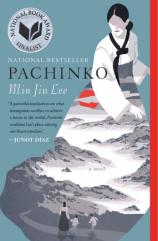Pachinko
Review
Pachinko
There are some books you walk away from feeling like a fuller version of yourself. There are certain rare reads that don’t feel finished after the final page, that you can quietly recognize will resonate within you always. Min Jin Lee’s PACHINKO is, undoubtedly and triumphantly, one of these books.
Resonant with the techniques of many great American novels and Yaa Gyasi’s phenomenal HOMEGOING, PACHINKO spans the generations of one Korean family from the early 1900s through nearly present day. It begins with a poor yet proud couple in a boarding house. Their beloved daughter, Sunja, finds herself mesmerized by a wealthy lover. When he betrays her, a young yet sickly minister offers to take her to Japan to begin a new life. As the war sets in and the danger deepens, Sunja and her family find themselves confronting poverty and prejudice, exiled from their homeland. The generations that follow struggle to make their way, through high-flying careers, heartbreaking losses, and the luck and allure of pachinko parlors.
"Whether you are familiar with Korean sociocultural mores or you’ve never so much as had kimchee, PACHINKO is an absolute must-read for any lover of astonishingly beautiful, necessary literature."
Lee explores the devastation of the World Wars on an intimate level through the too-often unheard perspective of small town Korean families. She delves into the racist divide between Japanese colonizers and Korean natives, and the intricacies of identity, family and belonging. She navigates Korean sex and gender roles, mental health, queerness, loss, longing and duty with a balanced hand. As the narrative moves through the gnarled family tree, each and every character reveals their desires and dreams, their weaknesses and their magnificent capacity for love and honor. My heart ached for them all. Each is deeply felt, and each has an essential tale feeding the immensely poignant saga of this family. Despite the broad scope of this project, not a single character lacks in depth or purpose to the plot. They grow within these pages, and following their journeys is a powerful experience.
The voices within PACHINKO evolve along with the family and the era, and Lee’s writing is consistently exceptional. She captures sentiment through language, and weaves in Korean and Japanese phrases and honorifics. The words breathe off the page in easy rhythms and draw you in. This reader happened to understand most terms without looking them up, but it’s easy enough to fill in the blanks if you’re unfamiliar. Overall, they serve to strengthen the world-building, and to further dedicate this book to the people and landscape to whom it belongs.
In her acknowledgements, Lee reveals that she first had the idea for this story in 1989, but held onto it and rediscovered it upon her husband’s work transferral to Tokyo in 2007, when her encounters with Korean Japanese people inspired her to delve into the work once again. We readers are lucky that she held on and held out, because the book is perfectly whole in this edition --- and because now is a crucial moment to highlight the intricacy and complexity of non-Western identity and displacement.
Lee delivers an authentic evocation of Korean culture through the bloodline of one family, from the traditions that helped shape modern Korean identity to the mixed marriages of the modern day. Whether you are familiar with Korean sociocultural mores or you’ve never so much as had kimchee, PACHINKO is an absolute must-read for any lover of astonishingly beautiful, necessary literature.
Reviewed by Maya Gittelman on February 9, 2017
Pachinko
- Publication Date: November 14, 2017
- Genres: Fiction, Historical Fiction
- Paperback: 512 pages
- Publisher: Grand Central Publishing
- ISBN-10: 1455563927
- ISBN-13: 9781455563920





